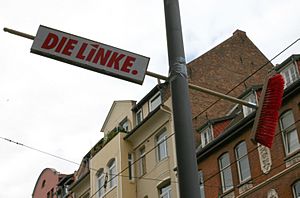Party of Democratic Socialism (Germany) facts for kids
Quick facts for kids
Party of Democratic Socialism
Partei des Demokratischen Sozialismus / Die Linkspartei.PDS
|
|
|---|---|
 |
|
| Abbreviation | PDS |
| Leader | Lothar Bisky |
| Founded |
|
| Dissolved | 16 June 2007 |
| Preceded by | Socialist Unity Party of Germany (SED) |
| Merged into | The Left |
| Headquarters | Karl-Liebknecht-Haus Kleine Alexanderstraße 28 D-10178 Berlin |
| Ideology |
|
| Political position | Left-wing |
| European affiliation | Party of the European Left |
| European Parliament group | European United Left–Nordic Green Left |
| Colours | Red |
| Website | |
| www.sozialisten.de | |
The Party of Democratic Socialism (German: Partei des Demokratischen Sozialismus, PDS) was a political party in Germany. It was active from 1989 to 2007. This party believed in democratic socialism. This means they wanted a society where everyone is equal and has a say.
The PDS took over from the Socialist Unity Party of Germany (SED). The SED used to be the main party in East Germany until 1990. From 1990 to 2005, the PDS was known as the main "left-wing" party in eastern Germany. It did not get much support in western Germany. However, in the eastern parts, it often won 15% to 25% of the votes. It even joined other parties to form governments in states like Mecklenburg-Vorpommern and Berlin.
In 2005, the PDS changed its name to The Left Party.PDS. It then teamed up with another party called the Electoral Alternative for Labour and Social Justice (WASG). This new team won 8.7% of the votes in the September 2005 elections. This was more than double what the PDS got by itself in 2002. On June 16, 2007, these two groups joined together. They formed a new party called The Left (Die Linke).
The PDS had many ideas to make society better. For example, they supported same-sex marriage. They also wanted more help for immigrants.
Internationally, the Left Party.PDS helped start the Party of the European Left. It was also the biggest party in the European United Left–Nordic Green Left group in the European Parliament.
Contents
A Look at the Party's History
The Fall of Communism in East Germany
On October 18, 1989, something big happened in East Germany. The leader, Erich Honecker, had to step down. This happened because people in East Germany wanted change. The Berlin Wall fell three weeks later, on November 9, 1989. This opened the borders between East and West Germany. Soon after, the government removed the rule that gave the SED party all the power.
On December 3, 1989, the SED leaders resigned. Younger politicians who wanted reforms took over. They looked to Soviet President Mikhail Gorbachev for ideas. He had policies called glasnost (openness) and perestroika (restructuring).
A special meeting of the party happened in December 1989. Gregor Gysi was chosen as the new leader. At this meeting, it became clear the SED was changing. The party decided to call itself the "Party of Democratic Socialism." Gysi felt this new name was important. It showed the party was moving away from its past. A speaker named Michael Schumann said, "We break forever with Stalinism as a system!" This was a very important moment. For a short time, the party was called "Socialist Unity Party of Germany - Party of Democratic Socialism."
By the end of 1989, many old party members had left. On February 4, 1990, the party officially became the PDS. Most of the old Communist leaders were removed. Some hardline members who did not like the changes left. They formed a new party.
The PDS faced its first free election in East Germany in 1990. They did not win much support. They got only 66 seats out of 400. They finished third behind other parties.
The Party in Reunified Germany
In 1990, Germany became one country again. In the first all-German elections, the PDS got only 2.4% of the votes. However, a special rule helped them. If a party in East Germany won 5% of the votes there, they could still get seats. So, the PDS entered the Bundestag (Germany's parliament) with 17 members. Gregor Gysi led them.
In the 1994 election, the PDS got more votes, reaching 4.4%. Gysi was re-elected. Three other PDS members also won seats. If a party wins at least three direct seats, they can get more seats based on their total votes. This helped the PDS get 30 members in the Bundestag. In the 1998 election, the party did even better. They got 5.1% of the national vote and 36 seats. This meant they had full status in the Bundestag.
The party seemed to have a bright future. But it relied a lot on Gysi. He was a very popular politician. When Gysi resigned in 2000, the party faced problems. In the 2002 election, their votes dropped to 4.0%. Only two PDS members won direct seats.
After this setback, the PDS made changes. They chose Lothar Bisky as their new leader. He was a respected moderate. The party started to feel more confident. In the 2004 European Parliament elections, the PDS won 6.1% of the votes. This was their highest result in a national election at that time. Their support in eastern Germany kept growing.
However, the party still struggled in western Germany. To fix this, they formed an alliance in 2005. They teamed up with the Labour and Social Justice – The Electoral Alternative (WASG). This group included former members of the Social Democratic Party. The new combined group was called The Left Party. In the 2005 election, The Left Party received 8.7% of the votes. They won 54 seats in the Bundestag.
Working Together with the WASG
The PDS and the WASG agreed to work together. They decided to run as one team in the 2005 German federal election. They also promised to become one party by 2007. The WASG candidates, including former SPD leader Oskar Lafontaine, ran on the PDS list. To show their new partnership, the PDS changed its name. It became The Left Party/PDS. In western states, they often just used "The Left" because PDS was seen as an "eastern" party.
This alliance helped the party get more votes. It had strong support in the east. The WASG also brought new voters in the west. Gregor Gysi and Lafontaine led the campaign together. They were both very energetic. After the election, they both led The Left's group in the Bundestag.
Early polls showed the new Left party doing very well. Some thought they might become the third-strongest party. But other politicians criticized them. They called Lafontaine and Gysi "left populists." They also accused the party of trying to attract extreme voters. Lafontaine made a mistake in one speech. He talked about "foreign workers" as a threat. This led to accusations that the party was using anti-immigrant ideas.
Even though some trade unions kept their distance, some union leaders showed interest in working with The Left after the election. Many local union leaders supported the party.
Results of the 2005 Federal Election
In the 2005 election, The Left Party became the fourth-largest party in the Bundestag. They won 54 seats. This was more than the Green Party (51 seats). Three Left Party members won their seats directly. They were Gregor Gysi, Gesine Lötzsch, and Petra Pau. All of them won in eastern Berlin. Another 51 members were elected based on the party's overall votes. These included Lothar Bisky, Katja Kipping, and Oskar Lafontaine.
The party doubled its votes from 2002. It went from 1.9 million to over 4 million votes. They even did very well in Saarland, a western state. This was largely because of Lafontaine's popularity there. The Left Party became the second strongest party in three eastern states. It was the third strongest in four other states, including Saarland. It was the only party that attracted voters from across the political spectrum. Many Social Democratic voters switched to The Left. Christian Democrats and Greens also lost votes to them.
Surveys showed that many people who did not vote in 2002 voted for The Left Party in 2005. About 390,000 non-voters returned to vote for them. The Left was seen as protecting Germany's social welfare system. This attracted voters in both western and eastern Germany.
Other parties had said they would not form a government with The Left Party. They did not change their minds after the election. This made it hard to form a government.
State Election Results in 2006
The Left Party lost many votes in the 2006 Berlin state election. Their support fell to 13%. However, Berlin's mayor decided to keep them as a partner in the government.
In Mecklenburg-Vorpommern, The Left Party did not lose much support. They remained the third-strongest party. But the Social Democratic leader decided not to work with them anymore. So, The Left Party became the main opposition party there.
Despite some losses, support for The Left Party/PDS remained steady. The two parties worked well together in the Bundestag. Even though some WASG members did not want to merge, the new party, The Left, was formed in 2007.
The Party in Local Government
The PDS had experience working in state governments. They were part of ruling groups in Berlin and Mecklenburg-Western Pomerania until 2006. This showed that the party could be practical, not just focused on ideas. It remained strong in local governments in eastern Germany. It had over 6,500 town councillors and 64 elected mayors. The party continued to win votes in the east. They focused on being good at governing. They did not want to be seen only as a "protest party." However, they did attract many protest voters. These voters were unhappy with high unemployment and cuts to public services.
Election Results Overview
Federal Parliament (Bundestag)
| Election year | Votes for local candidates | Votes for party list | % of party list votes | Total seats won | Change in seats | Notes |
|---|---|---|---|---|---|---|
| 1990 | 1,049,245 | 1,129,578 | 2.4 (#5) |
17 / 614
|
||
| 1994 | 1,920,420 | 2,066,176 | 4.4 (#5) |
30 / 622
|
||
| 1998 | 2,416,781 | 2,515,454 | 5.1 (#5) |
36 / 631
|
||
| 2002 | 2,079,203 | 1,916,702 | 4.0 (#5) |
2 / 603
|
Volkskammer (East Germany)
| Election year | Total votes | % of votes | Total seats won | Change in seats | Notes |
|---|---|---|---|---|---|
| 1990 | 1,892,381 | 16.4 (#3) |
66 / 400
|
European Parliament
| Election year | Votes for party list | % of party list votes | Total seats won | Change in seats | Notes |
|---|---|---|---|---|---|
| 1994 | 1,670,316 | 4.7 (#4) |
0 / 99
|
– | |
| 1999 | 1,567,745 | 5.8 (#4) |
6 / 99
|
||
| 2004 | 1,579,109 | 6.1 (#4) |
7 / 99
|
See also
 In Spanish: Partido del Socialismo Democrático para niños
In Spanish: Partido del Socialismo Democrático para niños
- The Left
- Politics of Germany
- List of political parties in Germany
- Bundestag (Federal Assembly of Germany)


